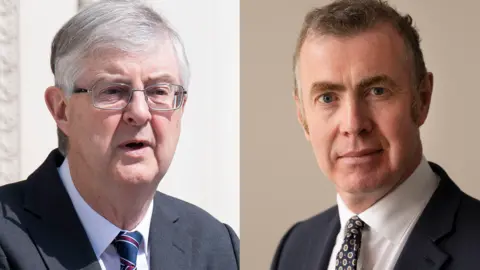Labour and Plaid Cymru deal set to last three years
 Getty Images
Getty ImagesWelsh Labour and Plaid Cymru's co-operation agreement in the Senedd is set to last for "the coming three years".
The deal aims to "address issues which take the greatest political and policy effort to resolve".
It includes a plan to get independent advice on bringing the net zero target date from 2050 to 2035.
Both parties said they would also support plans to increase the size of the Senedd.
In the document, seen by BBC Wales, First Minister Mark Drakeford and Plaid Cymru leader Adam Price said they would support an expansion from 60 to "80 to 100 members", a voting system "which is as proportional - or more - than the current one" and to introduce gender quotas in law.
Once a cross-party group has finished drawing up policies for a Senedd reform bill, Labour and Plaid Cymru promise to introduce the draft law "12 to 18 months" later.
Mr Drakeford said the deal would give the "stability we need in the Senedd to go on delivering for Wales", while Mr Price said the parties were taking a "historic step forward together".
What does the deal mean for Wales?
There is an aim to "work towards the creation of Ynni Cymru, a publicly owned energy company for Wales, over the next two years, to expand community-owned renewable energy generation".
Major reform to post-EU farm subsidies in Wales will not be brought in until 2025.
The parties have agreed to "introduce a transition period as we reform the system of farm payments so stability payments will continue to be a feature of the Sustainable Farming Scheme during and beyond this Senedd term" as the parties agree "the longer-term arrangements for Welsh agriculture".
The co-operation agreement promises to "commission an independent review of the local government section 19 and Natural Resources Wales reports" into the widespread flooding across south Wales after Storm Dennis last February.
Other policies featuring in the 11-page document include:
- Asking Transport for Wales "to explore the development of transport links between north and south Wales
- Invest more in flood management and mitigation
- Working with farmers to improve water and air quality
- Aim to change the school year and school day
- Develop a new culture strategy
- Introduce a new law around Welsh language education
- Extend Welsh language standards to more public bodies
Welsh Labour and Plaid Cymru's ruling bodies both approved the deal on Saturday.
The deal could still be scuppered if, against expectations, Plaid members vote against it at the party's virtual conference on the weekend.
The deal includes a pledge to extend free school meals to all primary school pupils, and expand the free childcare offer for two-year-olds.
 Getty Images
Getty ImagesThe deal includes a cap on second and holiday home numbers, a commitment to work towards parity of "reward and recognition" for health and care workers, and to reform building safety and provide more cash to help people in flats with cladding problems.
Other policies, already reported, include introducing local tourism taxes, publishing proposals on rent controls to make properties affordable for locals, reforming housing law to end homelessness and plans to change council tax.
How will it work?
The first minister has previously explained the talks were necessary because Welsh Labour has no overall majority to deal with "challenging and ambitious issues" as it has 30 of the 60 seats in Cardiff Bay.
The deal would not amount to a coalition between the parties, and Plaid Cymru members of the Senedd will not be entering government.
But BBC Wales has been told Plaid would be able to appoint special advisers to work on the deal in government.
A Welsh Conservatives spokesman said the "deal is remarkable for its absence of solutions to fix the NHS - currently experiencing its worst performance on record - or improve the economy in Wales".
"Labour's latest deal with the nationalists does not deliver on the priorities of working families across Wales, and will only cause constitutional chaos that risks holding back our economic recovery," he added.
What do the party leaders say?
Speaking at a press conference on Monday, Mr Drakeford said: "The chance to work with other parties wherever we have shared and common interests is something that has been here in the Senedd since the start of devolution and this agreement means we can continue to do that here in Wales.
"Today's agreement is a bespoke deal, this type of agreement has not been done before in the way that we are committed to doing."
"My focus and the focus of the government is on those bread and butter issues, which improve people's every day lives and which will help Wales to recover from this long pandemic."
Mr Price said: "Through it we plant together the seed beneath the snow of a new society, a new Wales, a new beginning."
He added the party leaders "continue to disagree on many things", but have an "ability to come together on some things".
Mr Price also criticised the "selfishness and greed" of Westminster and said Wales would be a "beacon of hope, progress and civility".

This agreement has been a long time coming and it is extremely wide-ranging, which demonstrates just how much Welsh Labour and Plaid Cymru have in common in their political outlook.
But some commitments are aspirational in tone and throw forward well beyond the scope of the three-year deal.
Plans to enlarge the Senedd are there, but Labour hasn't committed to a more proportional voting system.
Some of the potentially big - and difficult -reforms being promise, such as council tax and social care for example, don't give much of a clue as to how the parties hope to get there.
While this is not a coalition, Adam Price has argued for some Plaid special advisers in Welsh government to keep up momentum on this plan.
But momentum is key for Mark Drakeford, too - remember, he has said he's stepping down midway through this term.
If he wants legacy projects, like a fundamental reform of council tax - the nettle that no-one grasps because finding an alternative is so politically tricky - the clock is ticking.
